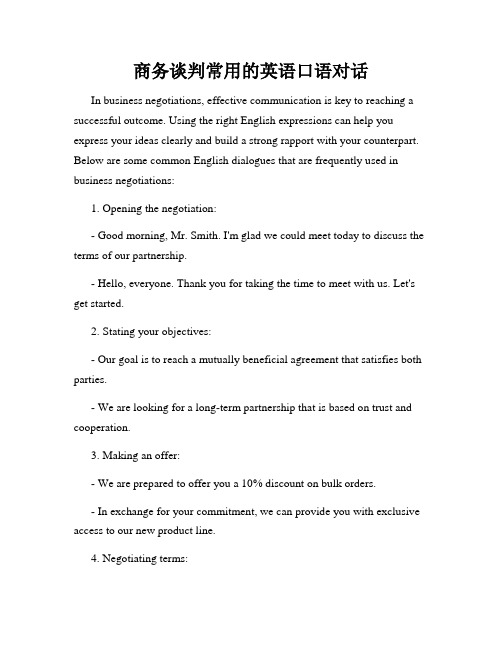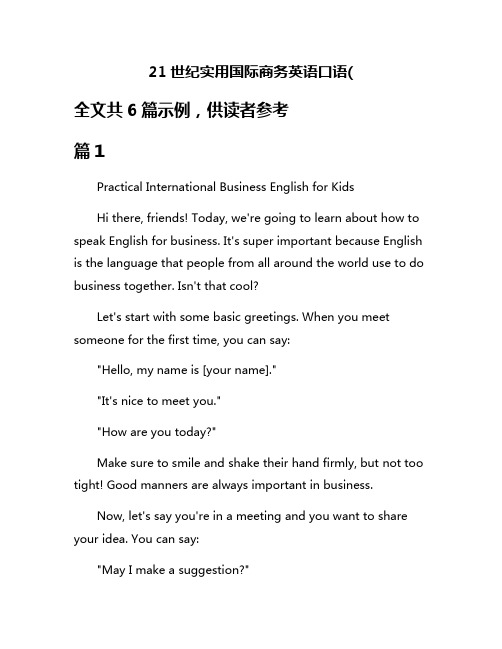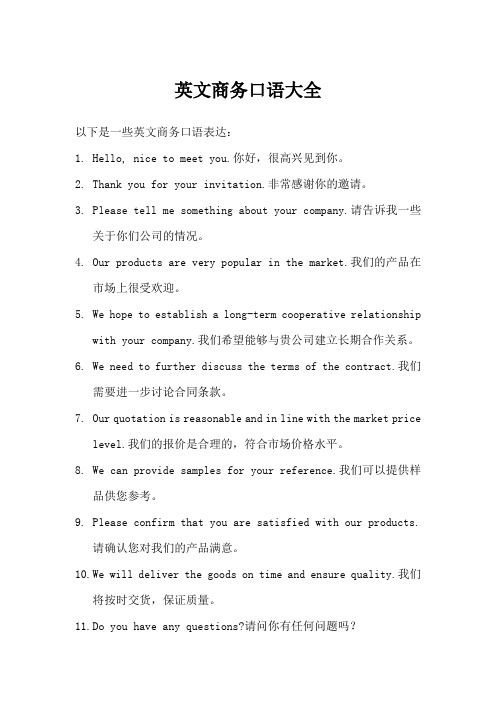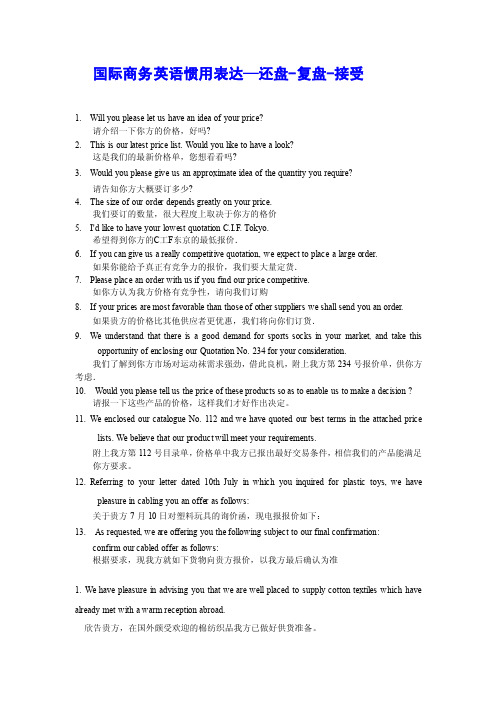商务英语-国际商务会议常用英语口语
商务英语社交礼貌用语

商务英语社交礼貌用语1. 问候:- Good morning/afternoon/evening.(早上好/下午好/晚上好。
)- How are you?(你好吗?)- It's a pleasure to meet you.(很高兴见到你。
)2. 介绍:- Let me introduce myself. I'm [name].(请允许我自我介绍一下。
我是[姓名]。
) - This is [person's name].(这是[某人的姓名]。
)3. 感谢:- Thank you for your time.(感谢你抽出时间。
)- Thank you for your assistance.(感谢你的帮助。
)- I appreciate your efforts.(我感激你的努力。
)4. 道歉:- I apologize for the delay.(我为延迟道歉。
)- Sorry for the inconvenience.(对不起给你带来不便。
)- Please accept our sincere apologies.(请接受我们真诚的歉意。
)5. 邀请:- We would like to invite you to our event.(我们想邀请你参加我们的活动。
) - Would you be available for a meeting on [date]?(你在[日期]有空参加会议吗?)6. 道别:- It was nice meeting you.(很高兴见到你。
)- Have a great day.(祝你今天过得愉快。
)- Goodbye and thank you again.(再见,再次感谢。
)记住,在商务场合中,礼貌用语不仅可以展现你的专业素养,还可以帮助建立良好的人际关系。
商务谈判常用的英语口语对话

商务谈判常用的英语口语对话In business negotiations, effective communication is key to reaching a successful outcome. Using the right English expressions can help you express your ideas clearly and build a strong rapport with your counterpart. Below are some common English dialogues that are frequently used in business negotiations:1. Opening the negotiation:- Good morning, Mr. Smith. I'm glad we could meet today to discuss the terms of our partnership.- Hello, everyone. Thank you for taking the time to meet with us. Let's get started.2. Stating your objectives:- Our goal is to reach a mutually beneficial agreement that satisfies both parties.- We are looking for a long-term partnership that is based on trust and cooperation.3. Making an offer:- We are prepared to offer you a 10% discount on bulk orders.- In exchange for your commitment, we can provide you with exclusive access to our new product line.4. Negotiating terms:- Can we discuss the possibility of extending the payment deadline by an additional 30 days?- We are willing to compromise on the price if you can guarantee a minimum order quantity.5. Responding to offers:- Your proposal is very attractive. However, we would like to negotiate the delivery schedule.- We appreciate your offer and will consider it carefully before making a decision.6. Seeking clarification:- Could you provide more details on the warranty terms for this product?- I'm not clear on the pricing structure. Could you break it down for me?7. Closing the deal:- It seems like we have reached a consensus on the terms. Shall we draw up a contract?- I believe we have addressed all the issues. Let's finalize the agreement and move forward.Remember, effective communication in business negotiations requires active listening, clear expression, and a willingness to compromise. By using these common English dialogues, you can improve your negotiation skills and achieve successful outcomes in your business dealings.。
21世纪实用国际商务英语口语(

21世纪实用国际商务英语口语(全文共6篇示例,供读者参考篇1Practical International Business English for KidsHi there, friends! Today, we're going to learn about how to speak English for business. It's super important because English is the language that people from all around the world use to do business together. Isn't that cool?Let's start with some basic greetings. When you meet someone for the first time, you can say:"Hello, my name is [your name].""It's nice to meet you.""How are you today?"Make sure to smile and shake their hand firmly, but not too tight! Good manners are always important in business.Now, let's say you're in a meeting and you want to share your idea. You can say:"May I make a suggestion?""In my opinion, we should...""I propose that we..."It's polite to ask for permission before speaking, and to use phrases like "in my opinion" or "I propose" to show that you're just giving your idea, not telling everyone what to do.Sometimes, you might not understand something that someone says. That's okay! You can ask them to repeat or explain by saying:"Could you please repeat that?""I'm sorry, I didn't quite understand.""Could you clarify what you mean by...?"Don't be afraid to ask questions! It's better to make sure you understand everything correctly.When you're talking to someone from a different country, it's important to be respectful of their culture. You can ask them about their customs and traditions by saying:"I'm interested in learning more about your culture.""Could you tell me about [a specific tradition or custom]?""What are some important values in your culture?"Just be sure to listen carefully and avoid making judgments or assumptions.At the end of a meeting or conversation, you'll want to wrap things up politely. You can say:"Thank you for your time.""It was a pleasure speaking with you.""I look forward to our next discussion."Remember, good communication is key in business. If you're ever unsure about something, don't hesitate to ask for help or clarification.That's a basic overview of some useful English phrases for international business. Keep practicing, and you'll be a pro in no time! Just remember to be polite, respectful, and always willing to learn from others.Good luck, my friends! Let me know if you have any other questions.篇221st Century Practical International Business English ConversationHi there! Let me tell you all about using English for international business these days. It's super important to be able to communicate well in English if you want to work with people from different countries.First off, you need to learn how to introduce yourself properly. You can say "Hello, my name is [Your Name]. It's nice to meet you." Then you should ask their name by saying "What's your name?" After exchanging names, you can ask where they are from by saying "Where are you from?"Once you've gotten to know each other a bit, you'll want to be able to talk about your job or business. You can explain what you do by saying "I work for [Company Name]. Wemake/sell/provide [Product or Service]." Then you can ask them about their company by saying "What does your company do?"An important part of business English is being able to set up meetings and appointments. You might say "I'd like to schedule a meeting to discuss our partnership opportunities. Are you available next Tuesday at 2pm?" If that time doesn't work, you can suggest alternatives like "How about Wednesday morning instead?"During meetings, you'll need to be able to make suggestions, agree, disagree, and negotiate. For example, you could say "Isuggest we increase our production by 20% next quarter. What do you think?" If you agree, say "That's a great idea, I'm on board." If you disagree, try "I'm not sure I agree with that approach. I was thinking we could try [alternative idea] instead."Don't forget to practice giving clear instructions and explaining processes step-by-step. "First, we'll need to review the sales projections. Next, we'll calculate our inventory needs based on those numbers. Then, we can move forward with placing the product order."Business English also involves lots of emails and written communication. You may need to send a formal email stating "I am writing to express my interest in your latest software product and request a quote." Or a more casual email like "Just wanted to give you a heads up that the shipment may be delayed by a couple of days."When making requests, be polite by saying "Would you be able to send me the report by Friday?" And don't forget to use please and thank you! "Thanks so much for your help on this project. I really appreciate your hard work."Sometimes miscommunications happen, and you'll need to clarify what someone means. You can say "I'm sorry, I didn'tquite understand. Could you please explain that again?" Or "What exactly did you mean when you said [xyz]?"Overall, using English for international business requires being able to introduce yourself, describe your work, schedule meetings, make suggestions, give instructions, send communications, make requests politely, and clarify misunderstandings. With practice, you'll be communicating like a pro!I hope these examples and tips help you get started with21st century practical international business English conversation. Just remember to speak slowly and clearly. Don't be afraid to ask someone to repeat themselves if you didn't understand. And keep studying - the more you practice, the better you'll get! Good luck!篇321st Century Practical International Business English ConversationHello friends! Today we're going to learn about how people talk to each other when they do business internationally. It's called international business English conversation, and it's superimportant in our modern world where companies work with partners from all over the globe.First, let's talk about greetings. When you meet someone for a business meeting or call, you want to be polite and friendly. You can say "Hello, it's nice to meet you" or "Goodmorning/afternoon/evening." If you know the person's name, you can say "Hello Mr./Ms. [Last Name]." Remember to smile and make eye contact too!After greeting each other, it's common to make small talk. This helps break the ice and make everyone feel comfortable before getting down to business talk. You can comment on the weather, ask how their day is going, or mention something about the city or country you're in. For example, "Lovely weather we're having today!" or "How are you enjoying your stay in Tokyo so far?"When it's time to discuss business, you'll want to be clear, concise, and professional in your language. Avoid using too many idioms or slang words that might be confusing. Instead, speak slowly and use simple vocabulary as much as possible. If there are any important numbers, facts or technical terms, repeat them clearly.It's polite to frequently use phrases like "If I understand correctly..." or "Please let me know if I'm explaining this properly." This shows you are listening carefully and want to make sure everyone is on the same page. Don't be afraid to ask for clarification if you don't understand something!During meetings and negotiations, learn to politely disagree if needed by saying "I see your point, however..." or "Another way to look at this is..." Always stay calm and respectful, even if there are disagreements or tense moments.When wrapping up, summarize the key points discussed and next steps. You might say "To summarize, we agreed to..." or "The next action item is for me to..." Thank everyone for their time, and use a polite closing like "It was a pleasure speaking with you" or "Thank you for your consideration."The most important things are to speak clearly, listen carefully, remain professional yet friendly, and try your best to understand each other. With practice, international business English conversation will become second nature!I hope these tips help you all become international business superstars. ??Just remember to be polite, stay positive, and never stop learning and growing. The world is an amazing place withso many opportunities when we can effectively communicate across cultures. What an exciting time to be alive!篇4Practical International Business English for KidsHi kids! Today we're going to learn about how to speak great English for doing business around the world. It's super important because English is the global language for trade and commerce. If you want to grow up and work with people from different countries, you'll need to know how to communicate clearly in English. Let's get started!First up, greetings! When you meet someone for the first time, you need to introduce yourself politely. You can say "Hello, my name is [Your Name]. It's nice to meet you." Then shake their hand firmly while smiling. Good eye contact is important too.If you're meeting someone you've met before, you can say "Good morning/afternoon, [Their Name]. How are you today?" Listen carefully to their response and reply. For example, if they say "I'm well, thanks," you can say "That's great to hear!"Now let's talk about making requests. Sometimes you need to ask for things at work. The magic word is "please." You couldsay "Please could you send me that report by tomorrow morning?" Or "Please may I have a Few minutes of your time?" Being polite goes a long way.Apologizing is also crucial for smoothing over any mistakes or miscommunications. You can say "I'm sorry for the delay in getting back to you." Or "Please accept my apologies for the inconvenience." Admitting fault shows you're professional.Expressing opinions is important too. You might need to share your thoughts in a meeting. Try phrases like "In my opinion..." or "From my perspective..." Then explain your idea clearly and concisely. For example, "In my opinion, expanding into that new market could be very profitable."Don't forget to use phrases to show you're listening attentively too. You could nod and say "I see..." or "Uh huh..." or "Go on..." This lets the speaker know you're engaged.Phone calls are very common too. Answer politely with "Good morning/afternoon, [Your Name] speaking." If you need to put someone on hold, say "Could you please hold for a moment?" When you return, apologize for the wait.For ending calls, say "Thank you for your time. Goodbye." If calling someone, make sure you have the right person by asking"Am I speaking with [Their Name]?" Be patient if there's a bad line and ask them to repeat anything you missed.Writing emails is a key skill too. Start with "Dear [Name]" and close with "Best regards, [Your Name]." Use formal language, get to the point quickly, and double check for any spelling or grammar errors.Meetings are important too. Arrive a few minutes early, come prepared with your notes, and be ready to contribute your ideas respectfully. If you need to interject, say "Excuse me, may I add something?"When negotiating deals, be assertive but not aggressive. You could say "I must insist on these terms." Or "That price is too high. Could we meet in the middle?" Stay calm and rational.Finally, socializing helps build bonds. Make small talk by commenting on neutral topics like weather, sports, or travel plans. Ask friendly questions about someone's job or family. Just avoid controversial subjects.Phew, that's a lot to cover! The key things are being polite, direct yet respectful, and really listening. With practice, you'll be chatting like an international business pro in English. Just believe in yourself and give it your best effort!篇5Practical International Business English for the 21st CenturyHi there! My name is Emma and I'm 10 years old. Today I want to talk to you about learning practical English for international business. Why am I qualified to teach you about this, you might ask? Well, my mom is a global business consultant and she's always jetting off to different countries for work. She has taught me all about the importance of speaking good English when working internationally.The first thing you need to know is that English is the language of international business. No matter where in the world you go, chances are the business people speak at least some English. From China to Chile, India to Italy, English is the common language that connects businesspeople from different cultures.So if you want to work for a multinational company or do business deals across borders, you gotta learn to speak English properly. And I'm not just talking about knowing vocab words from a textbook. You need practical, conversational English skills that prepare you for real-world business situations.Like, what if you get invited to a business dinner in Tokyo? You'll need to know how to make small talk appropriately. Stuff like:"It's a pleasure to meet you Mr. Tanaka. Your company has an excellent reputation in the semiconductor industry.""Thank you for the kind words. How was your flight from Chicago?"See? Just simple chitchat, but it's polite and shows you have good manners. Manners are super important in many Asian cultures when meeting someone for the first time.Or let's say you're negotiating a big contract with a German company. You have to learn phrases for accepting an offer but also politely disagreeing if needed. Like:"Your proposed payment terms are reasonable. However, we were hoping for a 60 day period before the first installment is due.""Sehr gut. We can agree to 60 days for the initial payment."Using phrases like "however" and "we were hoping" softens the disagreement so you don't sound too blunt or demanding. That's a very important communication style when dealing with Germanic cultures like German or Austrian businesses.Another example - what if you're presenting your company's new product to potential investors in Brazil? Well first off, Brazilians tend to be a bit more formal than Americans. So your greetings and introductions need to be polite:"Good morning honorable investors, esteemed colleagues. It is my distinguished privilege to present to you..."See how that sounds way more formal than just saying "Hey guys, let me tell you about our new product"? You gotta adjust your English to match the cultural norms.And when actually describing your product, you'll want to use clear, vivid language to get your point across. Something like:"Our revolutionary new software will seamlessly integrate with your existing IT infrastructure, enhancing productivity while providing robust data security protocols."Using good vocabulary with descriptive adjectives is important to explain your product's value proposition effectively.Oh, and let's not forget giving presentations aided by visual slides or multimedia. You'll need commands like:"If we could please direct your attention to the graph rendered on the screen...""This compelling video trailer will succinctly illustrate the key benefits..."See? Those are good practical English phrases for controlling the multimedia flow in a business presentation.No matter what international business scenario you encounter, you gotta be ready with the right kind of English vernacular. Stuff like:"Apologies, I didn't catch your previous statement - could you please repeat that?"That's a polite way to ask someone to repeat what they said if you missed it, rather than just blurting "Huh? What'd you say?"Or for managing a discussion: "Thank you for that insightful contribution. Does anyone else have a different perspective they'd like to add?"Using expressions like "insightful contribution" and "different perspective" just has a more professional tone than saying "good point" or "other opinions?"Oh and you can never go wrong with a friendly: "It was wonderful to make your acquaintance. I look forward to future opportunities for collaboration."Wrapping up a meeting politely with pragmatic phrases like those will leave your international colleagues with a positive impression.The possibilities for practical international business English phrases are endless! The key is learning vocabulary, grammar, and pragmatics beyond what you'd study in a basic English class. You need idioms, nuances, and tur s of phrase that are incredibly useful for the global workplace.Well, I could ramble on further but I'm gonna stop there. As you can see, speaking good business English for an international career is super important! It's not just about memorizing lists of vocab - it's about truly mastering the subtle communication skills required in diverse cultural contexts.If you wanna get ahead in today's globalized economy, listening to this 10-year-old is actually great advice! Maybe I'll become an English teacher for global businesses when I grow up. Just gotta be sure to always say "Kindly disregard any inaccuracies - I'm still learning too!" Honesty and humility are great traits for an educator.Thanks for reading, and happy language learning!篇6Practical International Business English for the 21st CenturyHi there! My name is Emma and I'm 10 years old. Today I want to talk to you about something really important – learning English for international business. You might be thinking "But Emma, I'm just a kid! Why do I need to learn about that?" Well, let me tell you!The world is getting smaller and smaller every day because of things like the internet, planes that can fly anywhere, and companies that do business all over the globe. That means even if you live in a small town, you could end up working with people from other countries when you grow up. Pretty cool, right?So if you want to be ready for that amazing future, you need to start learning international business English now. It's a type of English that helps people from different cultures and languages understand each other better when they are doing business together. Let me give you some examples of what I mean.First, there are lots of special words and phrases used in the business world that you need to know. Like if someone asks you to "think outside the box", it doesn't mean you should go sit in a cardboard box! It means you should come up with creative, new ideas. Weird phrase, huh?You also have to be careful to speak slowly, clearly and politely when talking to international clients or partners. In some languages, it's considered rude to get too casual or loud. Using proper titles like "Mr." or "Ms." shows respect too.Another big part of international business English is understanding different cultural traditions and customs. Like in some countries, it's impolite to look someone in the eye for too long during a conversation. Or certain hand gestures that are fine where you live might be offensive elsewhere. It's a small world, but cultures can be very different!See what I mean? Learning this kind of stuff now will make you awesome at international business communication when you're older. Then you can work with super cool companies, travel to amazing places, and make lots of new friends from all around the world. How great is that?I know it might seem kind of boring as a kid, but trust me, it's going to be so useful later on. The earlier you start practicing international business English, the better you'll get at it. Who knows, you might even help your parents out with some big international deal one day! How's that for girl power?Okay, I could go on and on about why this is so important, but I don't want this to turn into a whole book. Just remember -learning international business English now will open up incredible opportunities for you in the future. You'll be able to communicate with partners, seal deals, and become a true global business superstar!So what do you say? Are you ready to start learning all about it? I know I sure am! Let's do this together and get prepped for that awesome international career. The world is waiting for us!。
脱口说英语 商务口语大全

英文商务口语大全以下是一些英文商务口语表达:1.Hello, nice to meet you.你好,很高兴见到你。
2.Thank you for your invitation.非常感谢你的邀请。
3.Please tell me something about your company.请告诉我一些关于你们公司的情况。
4.Our products are very popular in the market.我们的产品在市场上很受欢迎。
5.We hope to establish a long-term cooperative relationshipwith your company.我们希望能够与贵公司建立长期合作关系。
6.We need to further discuss the terms of the contract.我们需要进一步讨论合同条款。
7.Our quotation is reasonable and in line with the market pricelevel.我们的报价是合理的,符合市场价格水平。
8.We can provide samples for your reference.我们可以提供样品供您参考。
9.Please confirm that you are satisfied with our products.请确认您对我们的产品满意。
10.W e will deliver the goods on time and ensure quality.我们将按时交货,保证质量。
11.D o you have any questions?请问你有任何问题吗?12.W e look forward to your reply.我们期待着您的回复。
13.W e can arrange a meeting to discuss this project.我们可以安排一次会议来讨论这个项目。
国际商务英语惯用表达—还盘-复盘-接受

国际商务英语惯用表达—还盘-复盘-接受1.Will you please let us have an idea of your price?请介绍一下你方的价格,好吗?2.This is our latest price list. Would you like to have a look?这是我们的最新价格单,您想看看吗?3.Would you please give us an approximate idea of the quantity you require?请告知你方大概要订多少?4.The size of our order depends greatly on your price.我们要订的数量,很大程度上取决于你方的格价5.I'd like to have your lowest quotation C.I.F. Tokyo.希望得到你方的C工F东京的最低报价.6.If you can give us a really competitive quotation, we expect to place a large order.如果你能给予真正有竞争力的报价,我们要大量定货.7.Please place an order with us if you find our price competitive.如你方认为我方价格有竞争性,请向我们订购8.If your prices are most favorable than those of other suppliers we shall send you an order.如果贵方的价格比其他供应者更优惠,我们将向你们订货.9.We understand that there is a good demand for sports socks in your market, and take thisopportunity of enclosing our Quotation No. 234 for your consideration.我们了解到你方市场对运动袜需求强劲,借此良机,附上我方第234号报价单,供你方考虑.10.Would you please tell us the price of these products so as to enable us to make a decision ?请报一下这些产品的价格,这样我们才好作出决定。
国际商务英语口语实训Module 10 Complaints, Claims and Settlem

Module 10.1 Raising a Claim for Inferior Quality
Speaking out
unpacked for inspection by the surveyors. L: Have you discovered what the exact causes of the rusted bolt seals were? J: It’s quite evident that the rust resulted from poor workmanship. L: How many bolt seals are in this condition? J: Sixty cases of them. L: Just a minute, if you please, Mr. Johnson. It was rather a singular case, for thousands of tons of this product have been exported and it seems that they were damaged en route.
Module 10.1 Raising a Claim for Inferior Quality
Reading in
Relevant expressions for making a claim. It seems that they were damaged en route. It was definitely damaged prior to loading onto the S. S “East Wind”. This has made it necessary for us to file a claim against you. I’ll ask our manufacturers to look into the matte. I’m looking forward to your reply.
国际商务英语谈判常见76句翻译练习

1. We wish you will give us a competitive price and we would rather have your CIF prices than FOB prices.我们希望你方能够报给我方一个较有竞争力的价格,并且希望你方报给我们CIF价(到岸价),而不是FOB价(离岸价)。
2. I’m afraid that the price is on the high side. How about reducing the price by 10%?我觉得这个价格偏高,把价格降低10%怎么样?3. I’m sorry to inform you that we have lodged a claim(提出索赔)against your companyon the goods for $500 for short weight.我非常遗憾地通知您,我们已针对货物短重一事向你公司提出索赔500美元。
4. We can assure you that we will do everything to effect the delivery(发货)as soon aspossible. This is the best we can do.我们可以向您保证我们将想尽一切办法尽快发货。
我们只能做到这一步了。
5. To meet you halfway, we suggest 50% of the payment should be made by confirmed (保兑的), irrevocable(不可撤销的)letter of credit(信用证), and the balance by D/P (付款交单).我们妥协一下吧,我们建议50%的付款用保兑的、不可撤消的信用证,其余的用D/P。
6. Now there remains one more point to discuss. What coverage(保险)will you take outfor the goods we have ordered?现在还有一个问题要讨论,你们准备给我们订的货买什么样的保险?7. Who is authorized to issue the inspection certificate(商检证)? What if the inspectioncan not be completed within the time limit?谁有权来发放商检证?如果商检不能在限期内完成将怎么办?8. I can’t give you the thumbs up right now, but I think it will be alright.我现在无法立刻同意,不过我想应该可以。
商务会议英语

1商务会议英语- -各种商务会议英语常见术语一、各种会议列表assembly 大会convention 会议party 晚会, 社交性宴会at-home party 家庭宴会tea party 茶会dinner party 晚餐会garden party 游园会dance(party), ball, fandango 舞会reading party 读书会fishing party 钓鱼会sketching party 观剧会birthday party 生日宴会Christmas party 圣诞晚会luncheon party 午餐会fancy ball 化妆舞会commemorative party 纪念宴会wedding dinner, a wedding reception 结婚宴会banquet 酒宴pajama party 睡衣派对buffet party 立食宴会cocktail party 鸡尾酒会welcome meeting 欢迎会farewell party 惜别会pink tea 公式茶会new years’s banquet 新年会year-end dinner party 忘年餐会box supper 慈善餐会二、召开会议常见术语rostrum 讲台public gallery 旁听席notice board 布告牌to convene, to convoke 召开convocation 会议standing orders, by-laws 议事程序rules of procedure 议事规则constitution, statutes 章程procedure 程序agenda 议程timetable, schedule 日程表,时刻表文档冲亿季,好礼乐相随mini ipad移动硬盘拍立得百度书包2item on the agenda 议程项目other business 其他事项to place on the agenda 列入议程working paper 工作文件opening 开幕the sitting is open 会议开幕appointment 任命三、出席会议代表术语member 成员membership 成员资格member as of right 法定代表life member 终身成员full-fledged member 全权代表head of delegation 代表团团长permanent delegate 常驻代表representative 代表alternate, substitute 副代表observer 观察员technical adviser 技术顾问auditor 审计员office 职务holder of an office 职称honorary president 名誉主席chairman 主席presidency, chairmanship, chair 主席团interim chairman 临时主席vice-president, vice-chairman 副主席rapporteur 文书,秘书former chairman 前主席(美作:past chairman) director general 局长,处长deputy director general 副局长,副处长secretary general 秘书长executive secretary 执行秘书商务英语会议议程方面的英语短句篇hall 大会rostrum 讲台public gallery 旁听席notice board 布告牌to convene, to convoke 召开convocation 会议standing orders, by-laws 议事程序rules of procedure 议事规则constitution, statutes 章程3procedure 程序agenda 议程timetable, schedule 日程表,时刻表item on the agenda 议程项目other business 其他事项to place on the agenda 列入议程working paper 工作文件opening 开幕the sitting is open 会议开幕appointment 任命to appoint 任命,委派speaker 报告人to make a speech, to deliver a speech 做报告to ask for the floor 要求发言to give the floor to 同意...发言(美作:to recognize) to take the floor, to address the meeting 发言declaration, statement 声明Am I in order? 我这样做符合议程规定吗? call to order 要求遵守秩序to raise a point of order 提出关于议程的问题general debate 长时间的讨论receivability可以接受,可接纳stand 立场,主张consensus 意见advisory opinion 顾问意见proposal 建议to table a proposal 提出建议clarification 澄清comment 评论to second, to support 赞成to adopt 通过to oppose 反对to raise an objection 提出异议to move an amendment 提出修正案to amend 修正second reading (法案、议案的)二读substantive motion 实质性的动议decision 决定ruling 裁决to reject 拒绝,驳回resolution 决议draft resolution 决议草案,提案first draft, preliminary draft 草案初稿whereases正式文件的开场白,前言4motivations 表明动机operative part 生效部分report 报告factual report 事实报告minutes, record 记录summary record 摘要纪录verbatim record 逐字纪录memorandum 备忘录to postpone, to adjourn, to put off 推迟,延期closure 闭幕式closing speech 闭幕词to adjourn the meeting, to close the meeting 散会出席国际商务会议常用英语口语篇1、Getting the Chairperson’s Attention 引起会议主席的注意(Mister/Madam) chairman. May I have a word? If I may, I think... Excuse me for interrupting. May I come in here? 2、Giving Opinions 表达意见I’m positive that... I (really) feel that... In my opinion... The way I see things... If you ask me,... I tend to think that... Asking for Opinions 询问意见Are you positive that... Do you (really) think that... (name of participant) can we get your input? How do you feel about...? 3、Commenting 做出评论That’s interesting . I never thought about it that way before. Good point! I get your point. I see what you mean. 4、Agreeing 表示同意I totally agree with you. Exactly! That’s (exactly) the way I feel. I have to agree with (name of participant).55、Disagreeing 表示异议Unfortunately, I see it differently. Up to a point I agree with you, but... (I’m afraid) I can’t agree 6、Advising and Suggesting 提出建议Let’s... We should... Why don’t you.... How/What about (I)suggest/recommend that... 7、Clarifying 澄清Let me spell out... Have I made that clear? Do you see what I’m getting at? Let me put this another way... I’d just like to repeat that... 8、Requesting Information 请求信息Please, could you... I’d like you to... Would you mind... I wonder if you could 9、Asking for Repetition 请求重复I’m afraid I didn’t understand that. Could you repeat what you just said? I didn’t catch that. Could you repeat that, please? I missed that. Could you say it again, please? Could you run that by me one more time? 10、Asking for Clarification 要求澄清I don’t quite follow you. What exactly do you mean? I’m afraid I don’t quite understand what your are getting at. Could you explain to me how that is going to work? I don’t see what you mean. Could we have some more details, please? 11、Asking for Verification 请求确认You did say next week, didn’t you? (’did’is stressed) Do you mean that...? Is it true that...?12、Asking for Spelling 请求拼写Could you spell that, please?Would you mind spelling that for me, please? 13、Asking for Contributions 请求赐教We haven’t heard from you yet, (name of participant). What do you think about this proposal? Would you like to add anything, (name of participant)? Has anyone else got anything to contribute? Are there any more comments? 14、Correcting Information 更正Sorry, I think you misunderstood what I said. Sorry, that’s not quite right. I’m afraid you don’t understand what I’m saying. That’s not quite what I had in mind. That’s not what I meant. 15、Keeping the Meeting On Target (time, relevance, decisions) 转入正题We’re running short of time. Well, that seems to be all the time we have today. Please be brief. I’m afraid we’ve run out of time. I’m afraid that’s outside the scope of this meeting. Let’s get back on track, why don’t we? That’s not really why we’re here today. Why don’t we return to the main focus of today’s meeting. We’ll have to leave that to anothertime. We’re beginning to lose sight of the main point. Keep to the point, please. I think we’d better leave that for another meeting. Are we ready to make a decision? 120句商务英语交际礼节实用套语便餐light meal 工作午餐working luncheon 自助餐buffet dinner/luncheon 答谢宴会return dinner 告别宴会farewell dinner 庆功宴glee feast 招待会reception 庆祝中华人民共和国成立四十五周年招待会Reception Celebrating the 45th Anniversary of the Founding of the People’s Republic of China 鸡尾酒会cocktail party 茶话会tea party 包餐/点餐table d’hote/a la carte7上菜serve a courst您的位置在这里Here is your seat. 请入席Please have a seat. 欢聚一堂enjoy this happy get-together 请随便Please yourself at home./Please enjoy yourself. 请各位随意用餐Help yourself please. 您喝点什么?what would you like to drink? 现在我提议,为了…和…之间的合作,为了…参议员的健康,干杯!At this point, I propose a toast: to the cooperation between …and …, to the health of Senator…, cheers! 最后,我借主人的酒,提议为…干杯!Lastly, taking up this glass of fine wine, I propose a toast to …请各位举杯并同我一起为所有在座的朋友们的健康干杯!I’d ask you to raise your glass and join me in a toast ot the health of all our friends present here. 敬您一杯。
- 1、下载文档前请自行甄别文档内容的完整性,平台不提供额外的编辑、内容补充、找答案等附加服务。
- 2、"仅部分预览"的文档,不可在线预览部分如存在完整性等问题,可反馈申请退款(可完整预览的文档不适用该条件!)。
- 3、如文档侵犯您的权益,请联系客服反馈,我们会尽快为您处理(人工客服工作时间:9:00-18:30)。
美联英语提供:商务英语-国际商务会议常用英语口语
关于商务英语,那些你不知道的事都在这里
/test/fayin.aspx?tid=16-73675-0
商务会议是商务活动的重要组成部分,商务人员在日常工作交往中必不可少的一项活动就是参加会议,是作为企业、公司实施有效领导、有效管理、有效经营的重要工具,而根据目标、性质的差异,商务会议又被分为多种类型。
接下来小编为大家整理了国际商务会议常用英语口语,希望对你有帮助哦!
1、Getting the Chairperson’s Attention 引起会议主席的注意
(Mister/Madam) chairman.
May I have a word?
If I may, I think...
Excuse me for interrupting.
May I come in here?
2、Giving Opinions 表达意见
I’m positive that...
I (really) feel that...
In my opinion...
The way I see things...
If you ask me,... I tend to think that...
Asking for Opinions 询问意见
Are you positive that...
Do you (really) think that...
(name of participant) can we get your input? How do you feel about...?
3、Commenting 做出评论
That’s interesting .
I never thought about it that way before. Good point!
I get your point.
I see what you mean.
4、Agreeing 表示同意
I totally agree with you.
Exactly!
That’s (exactly) the way I feel.
I have to agree with (name of participant).
5、Disagreeing 表示异议Unfortunately, I see it differently.
Up to a point I agree with you, but...
(I’m afraid) I can’t agree
6、Advising and Suggesting 提出建议
Let’s...
We should...
Why don’t you....
How/What about...
I suggest/recommend that...
7、Clarifying 澄清
Let me spell out...
Have I made that clear?
Do you see what I’m getting at?
Let me put this another way...
I’d just like to repeat that...
8、Requesting Information 请求信息
Please, could you...
I’d like you to...
Would you mind...
I wonder if you could...
9、Asking for Repetition 请求重复
I’m afraid I didn’t understand that. Could you repeat what you just said?
I didn’t catch that. Could you repeat that, please?
I missed that. Could you say it again, please?
Could you run that by me one more time?
10、Asking for Clarification 要求澄清
I don’t quite follow you. What exactly do you mean?
I’m afraid I don’t quite understand what your are getting at.
Could you explain to me how that is going to work?
I don’t see what you mean. Could we have some more details, please?
11、Asking for Verification 请求确认
You did say next week, didn’t you? (’did’is stressed)
Do you mean that...?
Is it true that...?
12、Asking for Spelling 请求拼写
Could you spell that, please?
Would you mind spelling that for me, please?
13、Asking for Contributions 请求赐教
We haven’t heard from you yet, (name of participant).
What do you think about this proposal?
Would you like to add anything, (name of participant)?
Has anyone else got anything to contribute?
Are there any more comments?
14、Correcting Information 更正
Sorry, I think you misunderstood what I said.
Sorry, that’s not quite right.
I’m afraid you don’t understand what I’m saying.
That’s not quite what I had in mind.
That’s not what I meant.
15、Keeping the Meeting On Target (time, relevance, decisions) 转入正题We’re running short of time.
Well, that seems to be all the time we have today.
Please be brief.
I’m afraid we’ve run out of time.
I’m afraid that’s outside the scope of this meeting.
Let’s get back on track, why don’t we?
That’s not really why we’re here today.
Why don’t we return to the main focus of today’s meeting. We’ll have to leave that to another time.
We’re beginning to lose sight of the main point.
Keep to the point, please.
I think we’d better leave that for another meeting.
Are we ready to make a decision?。
